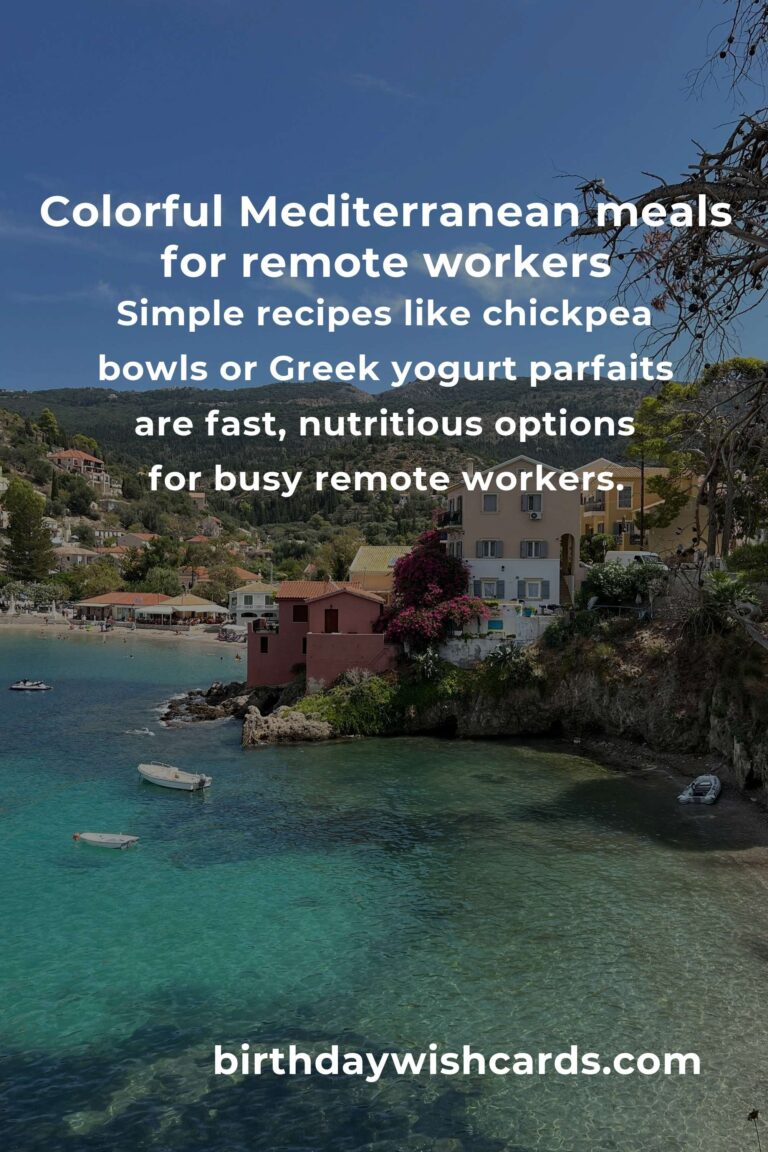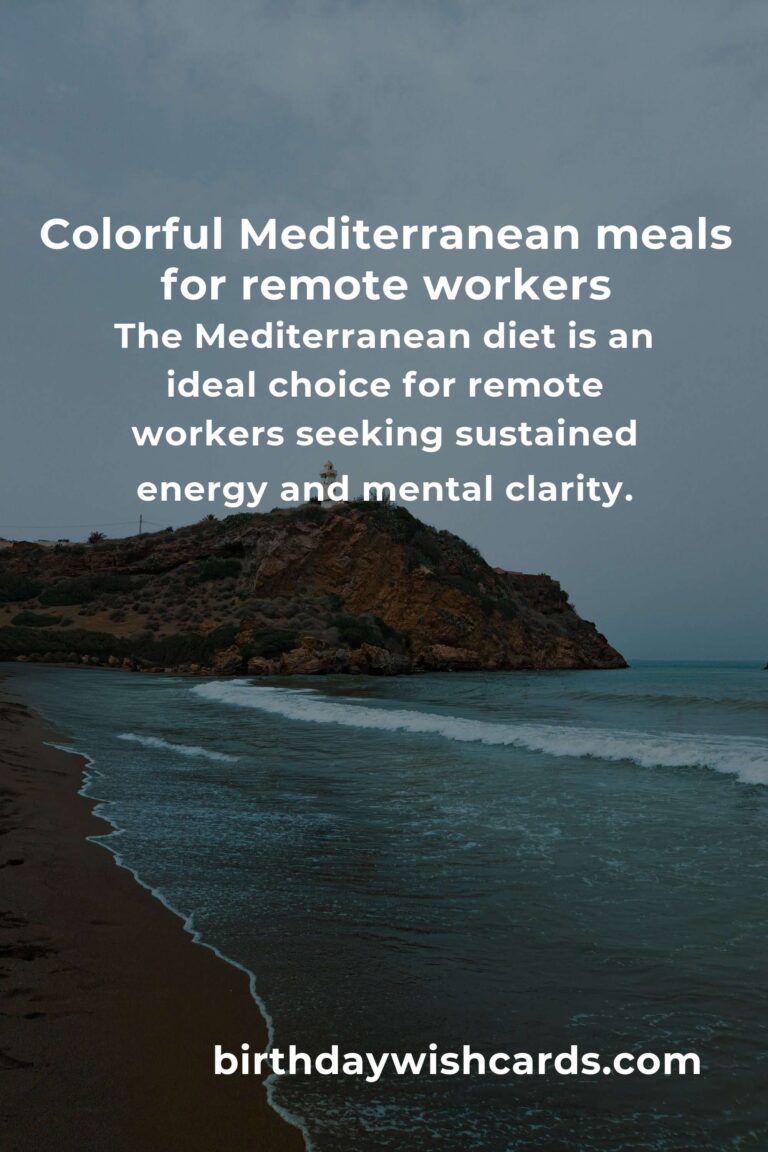
Working from home has become the new normal for millions of people worldwide. While remote work offers countless benefits—flexibility, comfort, and the freedom to design your own schedule—it also presents unique challenges for maintaining a healthy lifestyle. One of the biggest hurdles? Eating well when the fridge is just steps away, and the kitchen is always open. This is where the Mediterranean diet shines as a sustainable, delicious, and life-enhancing way to nourish your body and mind. In this complete guide, we’ll explore why the Mediterranean diet is perfect for remote workers, how to get started, what to eat, and practical tips for integrating it into your daily routine—so you can thrive both at work and in life.
Why the Mediterranean Diet Is Perfect for Remote Workers
The Mediterranean diet, inspired by the traditional eating habits of countries bordering the Mediterranean Sea, is consistently ranked among the healthiest diets in the world. It focuses on whole, minimally processed foods—fresh vegetables, fruits, whole grains, lean proteins, and healthy fats. Not only is it beneficial for physical health, but it also supports mental clarity, emotional stability, and long-term wellness—all essential for remote workers juggling the demands of work and life from home.
The Remote Work Nutrition Challenge
Remote work blurs the boundaries between professional and personal life. It’s easy to skip meals, snack mindlessly, or rely on quick, processed foods when deadlines loom. Over time, these habits can lead to fatigue, weight gain, and even burnout. The Mediterranean diet offers a solution by encouraging balanced meals, mindful eating, and a positive relationship with food.
The Science-Backed Benefits of the Mediterranean Diet
- Boosts Brain Power: Rich in omega-3s and antioxidants, this diet supports memory, focus, and cognitive performance—crucial for remote work productivity.
- Enhances Mood: Nutrient-dense foods help stabilize blood sugar and reduce inflammation, promoting emotional well-being.
- Supports Heart Health: A foundation of heart-healthy fats, whole grains, and vegetables lowers the risk of cardiovascular disease.
- Improves Gut Health: Fiber-rich foods fuel your microbiome, supporting immunity and digestion.
- Sustains Energy: Balanced meals prevent energy crashes, so you can stay productive all day.
Mediterranean Diet Basics: What to Eat and What to Avoid
Core Foods to Embrace
- Vegetables and Fruits: Tomatoes, leafy greens, cucumbers, bell peppers, berries, citrus, and more.
- Whole Grains: Brown rice, quinoa, farro, bulgur, barley, whole wheat bread and pasta.
- Legumes: Beans, lentils, chickpeas.
- Nuts and Seeds: Almonds, walnuts, pistachios, sunflower seeds, flaxseeds.
- Healthy Fats: Extra-virgin olive oil, avocado, small fish like sardines and salmon.
- Lean Proteins: Fish, seafood, chicken, eggs, moderate dairy (yogurt, cheese).
- Herbs and Spices: Basil, oregano, rosemary, garlic, parsley, mint.
Foods to Minimize or Avoid
- Processed and fast foods
- Refined grains and sugars
- Sugary beverages
- Red and processed meats
- Excessive butter and cream
Meal Planning for Remote Workers: Mediterranean Edition
Remote work offers the unique opportunity to prepare nourishing meals in your own kitchen. However, it’s easy to fall into a rut or get overwhelmed by too many options. Here’s how to meal plan like a pro:
1. Keep Staples Stocked
Fill your pantry with Mediterranean essentials: canned beans, whole grains, olive oil, spices, canned fish, nuts, and seeds. Keep fresh produce on hand and rotate according to season.
2. Batch Cook and Prep
Prepare grains, roasted vegetables, and proteins in advance. Store them in containers for easy grab-and-go lunches or quick dinners between meetings.
3. Simple, Satisfying Meals
- Breakfast: Greek yogurt with berries, honey, and walnuts; whole grain toast with smashed avocado and tomatoes.
- Lunch: Chickpea salad with cucumbers, tomatoes, feta, and olive oil; lentil soup with spinach and lemon.
- Snack: Sliced veggies with hummus; olives and almonds.
- Dinner: Grilled salmon with quinoa and roasted asparagus; whole wheat pasta with sautéed vegetables, garlic, and parmesan.
Healthy Habits for Remote Work Success
1. Schedule Regular Meal Times
It’s tempting to eat at your desk or skip meals altogether. Set specific times for breakfast, lunch, and snacks to avoid grazing and maintain steady energy levels.
2. Practice Mindful Eating
Step away from your screen during meals. Pay attention to flavors, textures, and your body’s cues. Mindful eating helps prevent overeating and encourages satisfaction with smaller, nutrient-rich portions.
3. Stay Hydrated
Keep a water bottle on your desk and sip throughout the day. Infuse water with lemon, cucumber, or mint for Mediterranean flair.
4. Move Often
Combine nutritious eating with regular movement. Stand up, stretch, or take a walk during breaks. This boosts circulation, mood, and focus.
Sample Mediterranean Diet Meal Plan for Remote Workers
Day 1
- Breakfast: Overnight oats with chia seeds, almond milk, figs, and pistachios
- Snack: Cucumber slices and hummus
- Lunch: Quinoa salad with cherry tomatoes, feta, olives, and spinach
- Snack: A handful of walnuts and an orange
- Dinner: Baked cod with roasted sweet potatoes and green beans
Day 2
- Breakfast: Greek yogurt with honey, strawberries, and flaxseed
- Snack: Bell pepper strips with tzatziki
- Lunch: Lentil soup, whole-grain pita, and a side salad
- Snack: Fresh figs
- Dinner: Grilled chicken with brown rice and sautéed greens
Tips for Staying on Track with the Mediterranean Diet at Home
- Meal Prep Sunday: Set aside a couple hours each week to prep veggies, cook grains, and roast proteins. This investment pays off during busy workdays.
- Healthy Snack Zone: Organize your fridge and pantry so nutritious snacks are visible and accessible. Place candies and chips out of immediate reach.
- Grocery List: Plan your weekly menu and stick to a shopping list to avoid impulse buys.
- Mindful Breaks: Use snack and meal times as a chance to reset and recharge—not just refuel.
- Social Support: Connect with friends or online groups who share your Mediterranean journey. Share recipes and encourage each other.
Best Mediterranean Diet Recipes for Busy Remote Workers
1. 10-Minute Mediterranean Chickpea Bowl
Ingredients: Canned chickpeas, cherry tomatoes, cucumber, kalamata olives, feta cheese, olive oil, lemon juice, parsley.
Instructions: Combine all ingredients in a bowl, drizzle with olive oil and lemon, toss, and enjoy.
2. Greek Yogurt Breakfast Parfait
Layer Greek yogurt, berries, chopped nuts, and a drizzle of honey in a jar. Grab and go for a protein-packed breakfast.
3. One-Pan Mediterranean Baked Salmon
Place salmon fillets, sliced zucchini, tomatoes, red onion, and olives on a baking sheet. Drizzle with olive oil, sprinkle with oregano, and bake at 400°F (200°C) for 15-20 minutes.
4. Easy Lentil Soup
Sauté chopped onion, carrots, celery, and garlic in olive oil. Add lentils, diced tomatoes, vegetable broth, and spices. Simmer until lentils are tender. Serve with whole grain bread.
How to Handle Cravings and Stay Motivated
Cravings are normal, especially when working from home. The Mediterranean diet isn’t about deprivation—it’s about balance, flavor, and satisfaction. If you crave something sweet, enjoy fresh fruit or a small square of dark chocolate. For savory cravings, snack on olives, nuts, or roasted chickpeas. Remember, progress is more important than perfection. Celebrate your wins and forgive occasional slip-ups.
Mindful Eating: The Secret Ingredient for Remote Work Success
Remote work can be isolating and stressful, sometimes leading to emotional eating. Mindful eating—bringing full awareness to the present moment—helps you reconnect with your body’s needs and cultivate a healthier relationship with food. Before eating, pause, take a breath, and ask yourself: Am I hungry? What does my body need? This simple practice can transform your eating habits and support overall well-being.
Frequently Asked Questions
Is the Mediterranean diet expensive?
The Mediterranean diet can be affordable! Focus on seasonal produce, bulk whole grains and legumes, and limit expensive specialty items. Planning ahead and cooking at home also saves money.
Can I follow the Mediterranean diet if I’m vegetarian or vegan?
Absolutely. Emphasize beans, lentils, whole grains, nuts, seeds, and a rainbow of vegetables. Use plant-based yogurt and cheese alternatives if desired.
How quickly will I see results?
Most people notice increased energy, improved mood, and better digestion within a few weeks. Long-term benefits like weight management and heart health build over months and years.
What if I slip up?
It’s normal to have occasional treats or busy days. The Mediterranean diet is about sustainable habits, not perfection. Just get back on track with your next meal.
Conclusion: Thrive as a Remote Worker with the Mediterranean Diet
Adopting the Mediterranean diet as a remote worker is more than a meal plan—it’s a lifestyle that prioritizes nourishment, balance, and joy. With its diverse flavors, flexible approach, and proven health benefits, the Mediterranean diet empowers you to eat well, feel energized, and perform at your best from home. Start small, experiment with new recipes, and enjoy the journey toward a healthier, happier you.
Ready to transform your remote work life? Stock your kitchen with Mediterranean essentials, plan vibrant meals, and savor every bite. Live well, work well, and thrive—one delicious meal at a time.
The Mediterranean diet is an ideal choice for remote workers seeking sustained energy and mental clarity.
Adopting this eating style can help reduce stress and prevent burnout, both common challenges in remote work.
Meal prepping and keeping healthy Mediterranean staples on hand make it easier to avoid unhealthy snacking during work hours.
Eating mindfully and away from your desk fosters a healthier relationship with food and boosts satisfaction.
Regular hydration and movement, combined with Mediterranean eating, support optimal productivity and well-being.
Simple recipes like chickpea bowls or Greek yogurt parfaits are fast, nutritious options for busy remote workers.
Even on a budget, the Mediterranean diet can be affordable by focusing on whole grains, legumes, and seasonal produce.
Cravings can be managed with wholesome Mediterranean snacks like fruit, nuts, or olives instead of processed foods.
Celebrating progress and not striving for perfection helps make the Mediterranean diet a sustainable lifestyle change.
Connecting with others on a similar wellness journey provides motivation and makes healthy eating more enjoyable.
#MediterraneanDiet #RemoteWorkWellness #HealthyEatingAtHome #WorkFromHomeTips #EatWellThrive

